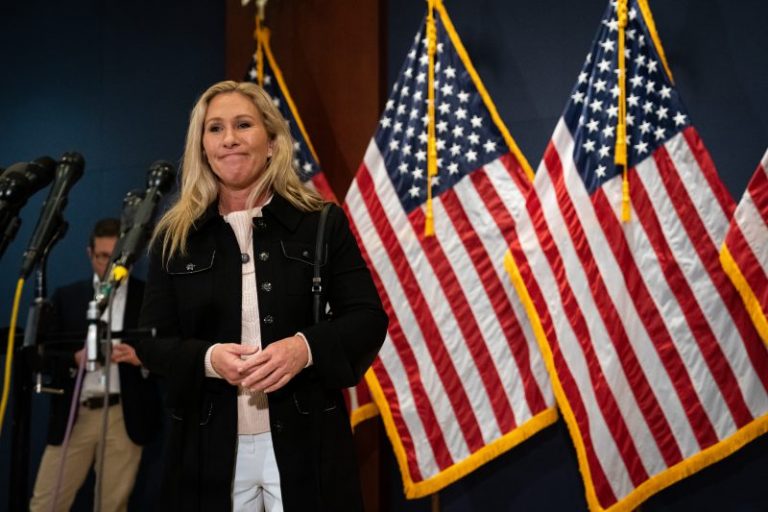There are probably three reasons that the most recent iteration of Rep. Marjorie Taylor Greene’s (R-Ga.) call for a “national divorce” ginned up an unusual furor. She’s said this before, lots of times, and — as desired — spurred outrage.
This tweet from Monday, then, is the same thing she’s said before.
We need a national divorce.
We need to separate by red states and blue states and shrink the federal government.
Everyone I talk to says this.
From the sick and disgusting woke culture issues shoved down our throats to the Democrat’s traitorous America Last policies, we are… https://t.co/Azn8YF1UUy
— Marjorie Taylor Greene (@mtgreenee) February 20, 2023
So why did it prompt such breathless, sweeping outcry? First, because calling for secession on Presidents’ Day, the holiday on which we remember Abraham Lincoln, is an interesting move. Second, because it was a holiday, people had more free time to get angry and less other news to get angry about.
But, third, Greene is in a very different position than she was when she made this claim in years past. Now, she’s part of the House majority and someone with House Speaker Kevin McCarthy’s (R-Calif.) ear. She is part of the Homeland Security Committee’s majority — as she advocates for the homeland splitting apart.
All of that in mind, though, it’s useful to remember that this is not a coherent argument but, instead, a mixture of troll and political attack. The representative who first gained national attention for her embrace of hyperpartisan baseless claims is not now offering a nuanced solution to America’s divisions.
Consider the practicalities here. Breezily suggesting that we “separate by red states and blue states” makes no real sense. This isn’t 1861, when the central point of contention — slavery — fell along a relatively clean, demarcated north-south divider. If we’re going to have a Bluemerica and Rednited States, if you will, then Marjorie Taylor Greene will either need to move north a few miles into Tennessee or be a sitting member of Blueamerica’s Congress. A minority member, presumably.
If we’re using 2020 results, in fact, her home state of Georgia would be an island of Bluemerica. Utah, on the other hand, would be a block of R.S. nearly surrounded by blue. If we start segmenting by counties, things get much messier much faster. Again understanding that we’re treating Greene’s unserious proposal seriously, we end up with an inevitable international conflict — or, more accurately, a civil war — regardless.
If we’re instead holding individual plebiscite votes in each state, where would states land? Are Georgians going to agree with Greene and join the R.S.? That hasn’t been the recent pattern in the state’s voting, really — and it’s safe to assume that a decision about leaving the United States would spur infrequent voters to cast a ballot. Would residents of red states, which tend to disproportionately benefit from our federal system, choose to cut off the investments of wealthier blue states?
One immediate effect would be a massive refugee crisis as Democrats in red states rushed to blue ones and Republicans in blue states move to red ones. Though here, too, there’s an imbalance. A lot more Republicans live in blue states than Democrats live in red ones. In fact, most of those who voted for Donald Trump in 2020 live in states President Biden won, since blue states tend to be more populous. Are the 1.1 million residents of Los Angeles County who voted for Trump in 2020 going to up and move to Arkansas? Probably not.
Look, this is a troll. Greene is one of the most internet-defined politicians in the Republican Party, a candidate whose political career emerged in the era of online lib-baiting. She’s saying stuff because she says stuff and generating controversy because this is her approach to politics.
She’s also trying to cast Democratic politics in the most stark, most dangerous terms. This is really the crux of her point: that Democrats are so dangerous and so deluded that they must be abandoned. Greene’s politics have been apocalyptic since her explicit QAnon days, and the temperature has not decreased much since. Why would it? Look how close she’s gotten to the centers of power by adopting this approach.
Perhaps the most telling part of Greene’s “proposal,” though, is her admission of how solipsistic it is.
“Everyone I talk to says this,” Greene admits of her “divorce” proposal. Again, we must resist the urge to take her assertions at face value, but it’s very likely that she, like many other hard partisans, really doesn’t speak to people from the other side of the aisle. Before the 2020 election, Pew Research Center found that 40 percent of Trump supporters had no friends who supported Biden.
The numbers for Biden supporters were similar, but fewer of them rejected the 2020 election results as tainted or unacceptable in part because they didn’t believe that so many people could have voted for the opposing candidate.
It would certainly behoove the Georgia congresswoman to seek out conversations in which everyone didn’t agree with her; refusing to engage in substantive discussion with your partners is, in fact, a good way to hasten an actual divorce.
But Greene isn’t really presenting a case for “divorce.” She is, instead, seeking out attention by calling for rupturing the nation in more palatable terms and doing so because she wants people to view Democrats the way she does: irreversibly corrupt and thoroughly evil.
An interesting approach to homeland security, indeed.

